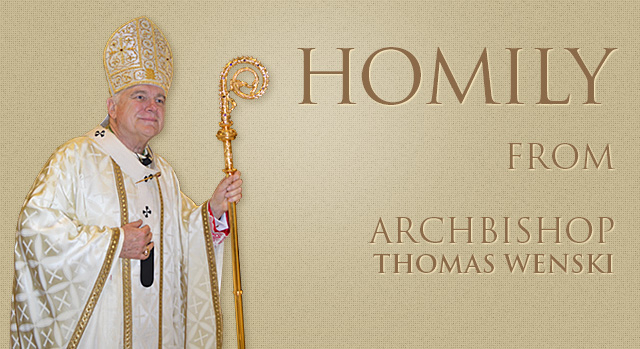By Archbishop Thomas Wenski - The Archdiocese of Miami
Homily by Archbishop Thomas Wenski at the 2016 Migration Mass at St. Mary Cathedral.
Today’s feast of the Epiphany celebrates God’s utter inclusivity. God who becomes our flesh in the child born in Bethlehem is Lord of the chosen people; he is also Lord of all peoples, Jewish and gentile. The Magi who come to Bethlehem to adore the Christ Child anticipate the great commission Jesus would later give to his disciples: “Go and make disciples of all nations.” In the Church, there are no borders – for all peoples find a home in her bosom. As mother she embraces us all who are made brothers and sisters of Christ in baptism and sons and daughters of the Eternal Father.
In a world of fragile peace and broken promises, in a world divided by fear, by prejudice, by ethnic and religious violence, the Church changed by her encounter with Christ – as the Magi were – is called as they were – to journey by another way, a way of encounter and communion.
Thus, in the Gospel of Matthew (25:35) Jesus tells his disciples, "I was hungry and you gave me food, I was thirsty and you gave me drink, I was a stranger and you welcomed me." The way of the Church is the way of the corporal and spiritual works of mercy, for we are called to be merciful like the Father, a mercy made visible to us in the life and ministry of Jesus.
The call to welcome the stranger, then, plays an important role in the lives of faithful Christians and has a particularly central place for those of us who experience the often dramatic reality of human mobility in this age of globalization. In a world in which we witness increasingly the globalization of indifference, in which fear and suspicion would have us build walls, the Church, which has been given a global mission, must promote the globalization of solidarity and work to build bridges of understanding and tolerance. As this New Year begins, political, economic and social forces have set in motion the greatest movement of peoples since the end of World War II. The migrant, who moves from one country to another, is truly a stranger in the midst. Often unfamiliar with the local tongue of the new country, not to mention its customs, the migrant needs the support of local communities so that she can better adjust to her new surroundings.
Today in our nation, a broken and inadequate immigration system has caused untold suffering with families divided and hopes for a better future deferred. And because politicians manipulate people’s fears, our nation has failed to address the urgent need for a fair, just and comprehensive immigration reform. As a local Church, we can take some holy pride in our efforts to welcome newcomers into our parishes as well as the work of our Catholic Charities and Catholic Legal Services in their efforts to accompany the immigrants in their struggles.
National Migration Week 2016 –celebrated by the Catholic Church throughout the United States– picks up on the theme of welcome and, in doing so, calls on each of us to welcome the stranger among us. The Archdiocese of Miami since its very beginning in 1958 has welcome successive waves of immigrants. Our experience has shown us that the newcomer, while perhaps a stranger, is not a problem to be shunned or feared but a brother or sister to be embraced and welcomed. Today we celebrate how the presence of immigrants and their children has enriched our parishes and our communities.
Like the Magi of yore, you too come bearing gifts. This Mass celebrated here at St. Mary’s Cathedral on every feast of the Epiphany brings together some of the various ethnic and language groups that make up the rich diversity of the Body of Christ here in South Florida. Many might think that South Florida’s diversity is defined by the large Hispanic presence; yet our reality is much larger and richer as is shown at this Mass. The various ethnic and language ministries of the Archdiocese of Miami represent a rich tapestry in which each thread is woven together in unity.
This tapestry can show a nation – and a world – increasingly torn apart by xenophobic fears – what a reconciled and a reconciling world should look like. As St. Paul tells us in today’s second reading, we all are “coheirs, members of the same body, and copartners in the promise in Christ Jesus through the Gospel.”

